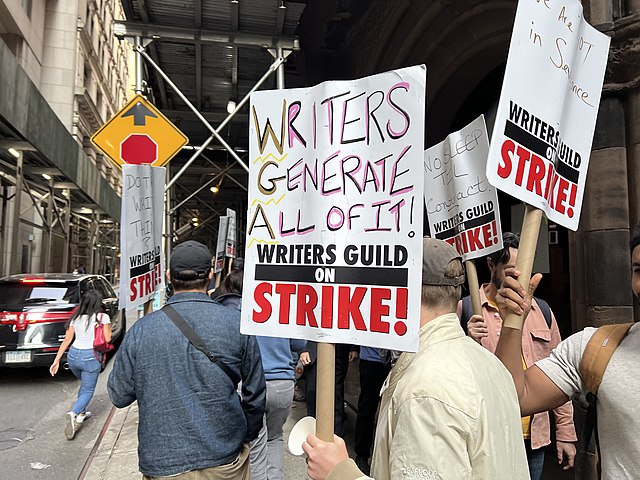Views expressed in opinion columns are the author’s own.
We may not actively think about it, but almost everything we experience is a direct result of another person’s work. Whenever we venture to Eppley Recreation Center, someone has paved the roads and sidewalks we walk on while others have built the machinery. This is all the more true in the entertainment industry. When we watch anything from Spider-Man: Across the Spider-Verse to Stranger Things, every utterance, camera pan, song change and outfit is meticulously crafted by other people. But the people who work for the media we love are grossly undercompensated. Accounting for inflation, median writer pay has decreased by a whopping 23 percent over the past decade.
The current writers strike, organized by the Writers Guild of America, began on May 2. The explosion in popularity of streaming services has allowed company executives to pocket exorbitantly high paychecks and expand while paying writers pennies, or just firing them instead. This drives the conflict between the WGA and Alliance of Motion Picture and Television Producers.
Prior to the current strike, there was one in 2007 that paralleled a similar issue: writers were not receiving just compensation for DVDs and downloads, famously shortening seasons of The Office and Breaking Bad. Now, the marginal gains from improved provisions including increases in writers’ residuals from downloads are irrelevant, as it pales in comparison to the amount that writers have lost over the years because of the rapid, unforeseen explosion in popularity and profitability of streaming services.
Regardless of the industry or time period, the only constant with such negotiations is that the resolution is never sustainable.
Something’s gotta give. The archaic structure of the filmmaking industry has withheld compensation and stifled expression for far too long; it’s time to shift towards democracy in the entertainment industry by ushering in the era of worker co-operatives.
If the need for repeated and prolonged strikes demonstrates anything, it’s that this system is unsustainable. These contractual disagreements are merely the symptom of a more fundamental problem: an imbalance of power. This power disparity is not a bug in the system, it’s been a constant feature of Hollywood.
Everyone, from ground-level workers to CEOs, should own these productions together. This would ensure fair compensation, and give movie industry employees a larger say in how their work is produced and distributed. This path ultimately leads to a more equitable, responsive and prosperous industry for all involved. On the whole, worker co-ops fare better than their rigidly hierarchical counterparts, and it’s easy to see why.
In an industry marred by grime and scandal, a co-op helps align the interests of each party involved. Oftentimes, we are told that CEOs and investors are the people assuming risk in business ventures, but what greater risk is there than losing your livelihood and creative work as a writer? By owning a company collectively, writers can realize the benefits of profitable and great shows, effectively aligning the incentives and salaries of executives and writers in a fairer way.
Companies like the Meerkat Media Collective prove that it’s possible to create award-level films while maintaining stability and freedom for those behind the metaphorical curtain, something that should be relatively intuitive. If an indie New York City-based production company can do that, imagine all of the untapped potential laying in the wings of multibillion dollar production companies.
Similarly those companies are notorious for cooking the books in order to underpay workers and avoid taxes. Democratizing these companies would reduce this ‘Hollywood accounting’ because those exercising creative freedom on the accounting sheet undercut the lower-level workers that would stand to gain from a seat at the table. Collective ownership incentivizes cleaner revenue reporting precisely because everyone stands to make more from residuals and pays the corresponding taxes.
Instead of a grotesquely wealthy executive netting a nearly quarter-billion dollar compensation package, maintaining a pay ratio of 2,972 to 1 to the median employee and fudging accounting numbers, traditionally lower-level workers can reap at least some of what they have sewn in a co-operative.
As both the Directors Guild of America and Screen Actors Guild and the American Federation of Television and Radio Artists express support for writers, they are also primed to potentially join the WGA’s strike by the end of this month. Great screenwriting and media production inspire us, and those who created that inspiration should never be so grossly undercompensated.
When a rising tide is only lifting yachts, we need to reevaluate and change our societal priorities.
Currently, for all of the brilliant minds that have spawned inspirational characters and genre-defining villains, there are only two options: write for less than you’re worth and suck it up, or don’t write at all. But there shouldn’t be. Systemic change is necessary in order to ensure a more just society, and democratizing Hollywood is the perfect start.
Rohin Mishra is a sophomore economics and government and politics major. He can be reached at rohinpmishra@gmail.com.



